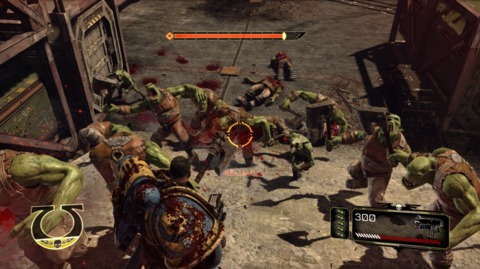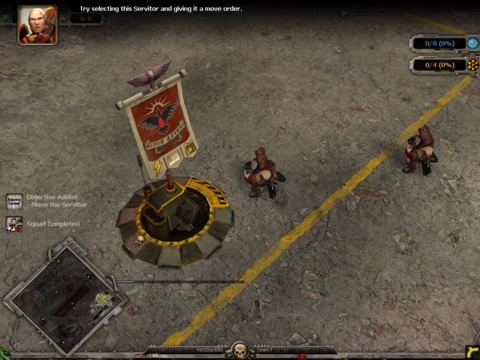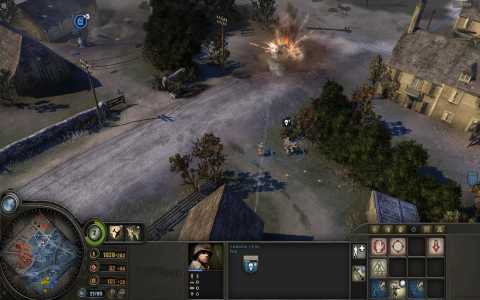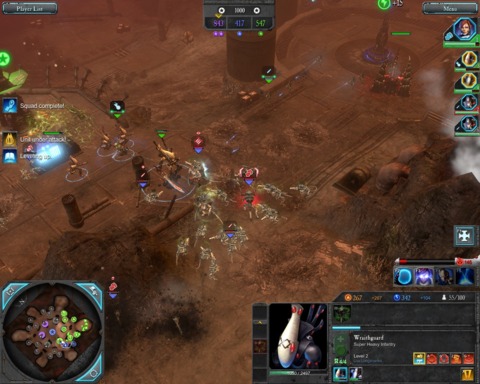Waaagh!!!
By majormitch 1 Comments
I dove head first into the Warhammer 40,000 universe recently, taking a whirlwind tour of its various video game offerings, all of which were developed by Relic Entertainment. I knew virtually nothing about the Warhammer 40k universe going in, but I did play a lot of regular old Warhammer (the tabletop game) growing up, so I’ve always been aware of its futuristic, space-faring alternative. And for the most part Warhammer 40k takes your traditional fantasy universe (Warhammer, Lord of the Rings, etc.) and translates it as directly as it can to a space setting. There are equivalents to many standard fantasy races like Orcs and Elves, and everyone talks with the obligatory British accent you’d expect. This actually makes the universe feel more like fantasy than sci-fi, despite the setting. The tone, plot and characters follow more traditional fantasy stereotypes, it just happens to take place in space instead of Middle-earth, and they use guns and machines in addition to swords and magic (both of which are still present). I find this to be an amusing mix, and really enjoy the universe’s setting and style. I mean, where else can you find British space Orks? (Yes, with a ‘k,’ that’s how they do it in space.)

Anyway, I kicked things off with the newest game of the bunch, Warhammer 40,000: Space Marine. The game is pretty much what you would expect: a straightforward, often mindless romp that involves shooting and smashing a lot of Ork and Chaos forces. It’s a super linear third person action game that lets you bounce back and forth between shooting and melee on the fly, and that’s certainly the game’s brightest spot from a gameplay standpoint. Otherwise it’s so rote and so simple that I felt it got old well before the end, which is telling since the game only took me like 6-7 hours to beat. Also, something I felt was off, the game goes out of its way to stress that you are this incredible badass, a 10 foot tall ultramarine that’s too powerful to be bothered with things like taking cover (hence no cover system). Yet even on the normal difficulty bullets can chew you up pretty good. The game never gets hard, but you do have to spend time hiding behind objects to regenerate health, and that time increases throughout the game. It felt weird.
While I think Space Marine’s gameplay is ultimately way too shallow, it is entertaining for a little while, and is at least backed up by the Warhammer 40k universe. My favorite thing about that is the way Orks and Goblins consistently yell “Space Marines!” almost every time they see you, which is basically every two minutes. Remember, this is all with a British accent too. They also yell “Waaagh!” a lot, which has always been a thing in Warhammer, and it’s equally funny. Everything in the game is also super meaty and tough looking, and it all generally looks and sounds pretty great (at least on the PC). This all comes together to make it an alright romp for a few hours, especially for the right price. Just don’t expect anything more than that.

Afterwards I moved on from action to strategy. I had always wanted to try the Dawn of War games, especially since I consider Company of Heroes a personal favorite. I started, naturally, with Warhammer 40,000: Dawn of War, and despite it being over eight years old I think it’s still really cool. I can definitely see how Dawn of War was a stepping stone towards Company of Heroes, and I really like Relic’s style of RTS that focuses on control points. It gives you incentive to move around the map right from the start, and focuses the action on key points without also including large, wasted sections of map. Otherwise, Dawn of War feels more like a traditional RTS than Company of Heroes. The large number of units, base-building and tech trees are pretty expansive, and it’s all done well. In fact, my favorite part about Dawn of War might actually be the wide variety of units between all the different armies. The bundle I got included the first two expansions (Winter Assault and Dark Crusade), which brought my total army count up to seven, each of which have unique units. While there are plenty of analogs between armies, there’s still a lot of different stuff to learn, and seeing how all of that plays out is really interesting to me. Some armies have other unique mechanics as well, such as how they improve their population cap or gather resources. There’s a surprising amount of variety in the game, and while I have no idea if it’s actually balanced or not, it makes the game really fun to mess around with.

Part of me wonders if the control points idea came from Relic’s desire to translate a tabletop wargame to a video game. They clearly wanted to make a faster paced game than Warhammer 40k’s slower turn based roots, but by adding control points to a RTS they’ve included an extra element of battlefield control that’s inherent to tabletop wargames. The idea of building squads rather than individual units also seems like a very tabletop thing, as does the way you can equip units with different types of weapons (which you can do in Warhammer, and presumably Warhammer 40k too). That may or may not be how the idea came about, but I would be curious to know. Either way, I think it’s a great fit. I also think they refined the idea in Company of Heroes, where they reduced the number of buildings and units in the game, and designed maps more smartly with control points in mind. It got a little bit farther away from your traditional RTS, and focused even more on getting you out on the battlefield as quickly as possible. I feel like Company of Heroes struck a good balance that ultimately works a little better than Dawn of War, but I still like Dawn of War quite a bit.

Warhammer 40,000: Dawn of War II then takes the idea another step past Company of Heroes, almost to its logical extreme. It has no base-building at all, and virtually the entire focus is on the battlefield. The maps feel even smaller and more action-oriented than they did in Company of Heroes, and the way you always start with a hero who has their own unique abilities (and can equip gear) makes it even more clear that your attention should be on your troops rather than your base. It has a really snappy pace to it that can be intense, as you’re pretty much in the thick of things from start to finish. I had fun with Dawn of War II for many of the same reasons I like Relic’s other strategy games, and I think the fast paced nature of it can be pretty exciting at times. But I also think they might have taken it a little too far. In fact, while I enjoy all three of Relic’s strategy games, I think Company of Heroes finds the best overall balance. Dawn of War gets a little too bogged down with some traditional RTS management, and Dawn of War II loses a little too much of it. Those are minor complaints at best, as I think all three games are great; I’m simply splitting hairs at this point.
Both Dawn of War games also make great use of the Warhammer 40k license. I didn’t play any of the campaigns in either game or their expansions, as I was more interested in experimenting with each army in skirmishes than being tied to one army for a dozen hours or so. But the way the units look and sound, the bold world design, the bombastic music (Dawn of War was composed by Jeremy Soule, he of Elder Scrolls fame) and the general aesthetic all combine to bring the universe to life. It’s a good universe to spend time in, and I’ve enjoyed my time with it. The games themselves are no slouch either, and hopefully we’ll see more Warhammer 40k inspired work from Relic in the future.

1 Comments